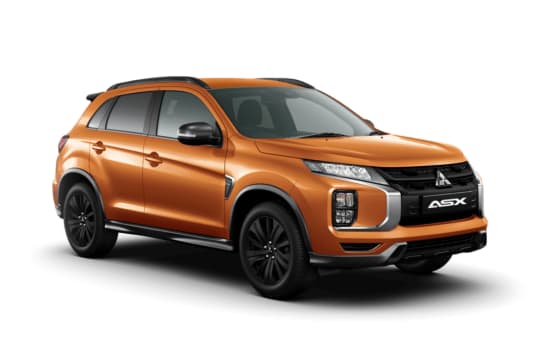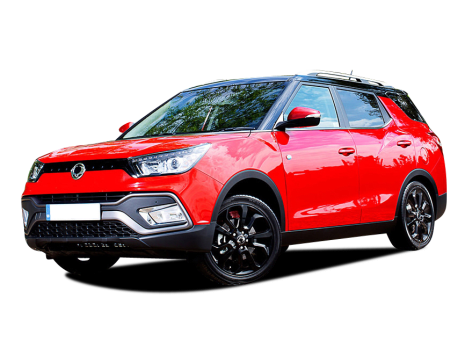
Fiat 500X VS Ssangyong Tivoli
Fiat 500X
Likes
- Fun looks
- Good interior
- Great safety package
Dislikes
- Iffy transmission
- Oddball ride
- Slow
Ssangyong Tivoli
Likes
- Pricing
- Warranty
- Interior space
Dislikes
- No ANCAP rating
- Feels underpowered
- Not as refined as some rivals
Summary
Fiat 500X
Fiat's indomitable 500 is one of the great survivors - not even VW's recently deceased New Beetle could keep riding the nostalgia wave, partly because it made itself just that little bit out-of-touch by not being a car anyone can buy. The 500 avoided that, particularly in its home market, and is still going strong.
Fiat added the 500X compact SUV a few years ago and at first I thought it was a daft idea. It's a polarising car, partly because some people complain it's capitalising on the 500's history. Well, duh. It's worked out well for Mini, so why not?
I've driven one every year for the last couple so I was keen to see what's up and whether it's still one of the weirdest cars on the road.
| Safety rating | |
|---|---|
| Engine Type | 1.4L turbo |
| Fuel Type | Premium Unleaded Petrol |
| Fuel Efficiency | 5.7L/100km |
| Seating | 5 seats |
Ssangyong Tivoli
SsangYong is looking to crash-tackle Australia’s small SUV market segment with its competitively priced, feature-packed Tivoli as part of its brand relaunch here. A seven-year warranty is also set to make the Tivoli even more appealing.
SsangYong Australia is SsangYong’s first fully owned factory subsidiary outside of Korea and the Tivoli is part of its four-model push to re-establish itself as a brand worth your car-buying bucks.
So can the Tivoli get a foothold in an already-busy small SUV segment, loaded with the likes of Mazda CX-3 and Mitsubishi ASX? Read on.
| Safety rating | |
|---|---|
| Engine Type | 1.6L |
| Fuel Type | Regular Unleaded Petrol |
| Fuel Efficiency | 6.6L/100km |
| Seating | 5 seats |
Verdict
Fiat 500X6.8/10
The 500X is a fun-looking alternative to the various options available from everyone else and is - overall - better to drive than its Renegade twin.
It packs a very good safety package which you can't ignore but does lose points on the warranty and servicing regime. But it's also built to take four adults in comfort, which not every car in the segment can boast.
Would you choose the Fiat 500X over one its better-known competitors? Tell us in the comments section below.
Ssangyong Tivoli6.9/10
The Tivoli is an all-round, reasonable small SUV – comfortable inside, and okay to look at and drive – but SsangYong is hoping that its drive-away pricing and seven-year warranty is enough to set the Tivoli apart from some of its more modern-looking rivals.
As is, the Ultimate AWD is the pick of the bunch.
The Tivoli is a pretty good value-for-money prospect, but the updated, facelifted Tivoli, due here in Q2 2019, might be an even more appealing proposition.
What do you think of the Tivoli? Tell us what you reckon in the comments section below.
Design
Fiat 500X7/10
Look, I like the 500X, but I know why people don't. It's clearly a 500X in the way a Mini Countryman is a Mini. It looks like a 500, but get closer and you see the difference. It's chubby like a $10 weekend market Bhudda statue and has great big googly eyes like Mr Magoo. I find this endearing, my wife does not. The looks aren't the only thing she doesn't like.
The cabin is a bit more restrained and I quite like the band of colour stretching across the dash. The 500X is meant to be a bit more grown up than the 500, so there's a proper dash, more sensible design choices but it still has the big buttons, perfect for the meaty fingers of people who won't be buying this car.
Ssangyong Tivoli7/10
The Tivoli, named after the Italian town near Rome, is a neat-looking little buzzbox, with a touch of the Mini Countryman about it, as well as a healthy dash of chunky retro styling.
While it may not be the most exciting thing around to look at, it sits low and squat and certainly has a nice presence to it. Take a look at the accompanying photos and make up your own mind.
Practicality
Fiat 500X7/10
At just 4.25 metres, the 500X isn't big, but makes the most of what it's got. The boot impresses at 350 litres and with the seats down, I think you could reasonably expect to triple that figure, though Fiat doesn't have an official number that I can find. For added Italian feel, you can tip the passenger seat forward to get really long things in, like a Billy bookshelf flat pack from Ikea.
Rear seat passengers sit high and upright meaning leg and kneeroom are maximised and with that tall roof, you won't scrape your head.
The doors each have a small bottle holder for a total of four and Fiat has got serious about cupholders - the 500X now has four.
Ssangyong Tivoli7/10
For a small SUV, it feels like there’s a fair bit of functional space inside the Tivoli.
Interior width is 1795mm and it feels like designers have pushed that room right out to the fringes – up and out – because there’s plenty of head and shoulder room for driver and passengers, including those in the back seat. The ergonomic D-shaped leather steering wheel, crisp instrument cluster, quilt-stitch trim and semi-bucket-style leather seats also add up to a real premium feel for the cabin, and the multi-media unit is easy enough to use.
The Tivoli’s storage spaces include an iPad-sized spot in the centre console, glove box and inner tray, an open tray, twin cupholders, door bulges for bottles, and a luggage tray.
Rear luggage space in the Ultimate is a claimed 327 cubic litres because of its full-size spare tyre under the floor; it’s 423 litres in lower specs with space-saver spares.
The second-row seats (a 60/40 split) are rather supportive for a back pew.
Price and features
Fiat 500X7/10
I drove the Pop Star, which is the second of the now-two model "regular" range, the other being the, er, Pop. I drove a Special Edition in 2018 and it's not clear if it is Special as there's also an Amalfi Special edition. Anyway.
The $30,990 (plus on-road costs) Pop Star has 17-inch alloys, six-speaker Beats-branded stereo, dual-zone climate control, reversing camera, keyless entry and start, active cruise control, sat nav, auto headlights and wipers, leather shifter and steering wheel and a space-saver spare.
The Beats-branded stereo speakers are supplied with noise from FCA's UConnect on a 7.0-inch touchscreen. The same system is in a Maserati, don't you know. Offering Apple CarPlay and Android Auto, UConnect loses points by shrinking the Apple interface into a lurid red frame. Android Auto properly fills the screen, for some reason which is ironic given Apple owns the Beats brand.
Ssangyong Tivoli7/10
There are six variants in the 2019 Tivoli range: base-spec 2WD EX with a 1.6-litre petrol engine (94kW and 160Nm) and six-speed manual gearbox ($23,490); 2WD EX with a 1.6-litre petrol engine and six-speed automatic ($25,490); mid-spec 2WD ELX with a 1.6-litre petrol and six-speed auto ($27,490); 2WD ELX with a 1.6-litre turbo-diesel engine (85kW and 300Nm) and six-speed auto ($29,990); AWD Ultimate with a 1.6-litre turbo-diesel and six-speed auto ($33,990); and top-spec two-tone paint AWD Ultimate 1.6-litre turbo-diesel and six-speed auto ($34,490).
We drove the two-tone Ultimate at the launch of the new range.
As standard, every Tivoli has a 7.0-inch touchscreen media system with Apple CarPlay and Android Auto, auto emergency braking (AEB), forward collision warning (FCW), reversing camera, and seven airbags.
The EX gets leather-covered steering wheel, telescopic steering, fabric seats, front/rear park assist, lane-departure warning (LDW), lane keep assist (LKA), high-beam assist (HBA), and 16-inch alloy wheels.
The ELX also gets the optional 1.6-litre diesel, roof rails, luggage screen, dual-zone air-conditioning, tinted glass, and HID headlamps.
The Ultimate gets AWD, leather seats, powered/heated/vented front seats, sun roof, 18-inch alloy wheels, and a full-size spare tyre. The Ultimate 2-Tone, as indicated, gets the two-tone colour package.
Every SsangYong has a seven-year/unlimited-kilometre warranty, seven years’ roadside assistance and a seven-year service-price plan.
Note: There were no petrol versions of the Tivoli to drive at the launch. The Tivoli XLV, an extended body version of the Tivoli, was not available for testing at the launch, either. An updated, facelifted Tivoli is due here in Q2 2019.
Under the bonnet
Fiat 500X7/10
Fiat's rather excellent 1.4-litre turbo MultiAir does duty under the stubby bonnet, making 103kW and 230Nm. Rather less excellent is the six-speed dual-clutch automatic transmission, which sends power through the front wheels only.
It's rated to tow a 1200kg braked trailer and 600kg unbraked.
Ssangyong Tivoli6/10
The 1.6-litre petrol engine produces 94kW at 6000rpm and 160Nm at 4600rpm.
The 1.6-litre turbo-diesel engine punches out 85kW from 3400-4000rpm and 300Nm from 1500-2500rpm.
The diesel donk and six-speed auto generally work okay together, although on a few fast-blast, bendy back roads, the Tivoli was heading up a gear when it should have grabbed a lower one.
Efficiency
Fiat 500X6/10
Fiat rather optimistically suggest you'll get a combined cycle figure of 5.7L/100km but try as I might, I couldn't do better than 11.2L/100km. What's worse, it demands 98RON fuel, so it's not the cheapest car to run. This figure us consistent with past weeks in the 500X and no, I wasn't thrashing it.
Ssangyong Tivoli7/10
With the petrol engine, fuel consumption is claimed as 6.6L/100km (combined) for the manual and 7.2L/100km for the auto.
With the turbo-diesel engine, it’s claimed as 5.5L/100km (in the 2WD auto) and 5.9L/100km in the AWD auto. After a short, fast blast in the top-spec Ultimate, we were seeing 7.6L/100km on the dash.
Driving
Fiat 500X6/10
Again, I shouldn't like the 500X but I really don't mind it. It's flawed, which might be why.
The dual-clutch transmission is dumber than a box of loose cogs, lurching from start and looking the other way when you expect it to shift. We know the engine is a good one and I think part of the reason it's so thirsty is the confused way the transmission goes about its business. I'd love to drive a manual to see what it's like.
The 500X initially feels worse than its Jeep Renegade sibling-under-the-skin, which is quite an achievement. Part of that is to do with the ride, which is very choppy below 60km/h. The first 500X I drove wallowed about but this one is a bit tauter, which would be good if you weren't punished with this bounciness.
The seats themselves comfortable and the interior is a good place to hang out. It's reasonably quiet, too, which is at odds with the old-school silliness of its conduct. It feels like Labrador let out of after day kept inside.
And that's where the car I shouldn't like is a car I do like - I really like that it feels like you're on Roman cobblestones, the type that make your knees hurt when you walk on them for a day. The steering wheel is too fat and is at a weird angle, but you kind of square up to it and drive the car like your life depends on it. You have to take it by the scruff, correct the shifts with the paddles and show it who's boss.
Obviously, that's not for everyone. If you drive it really gently, it's a very different experience, but that means going slowly everywhere, which is no fun at all and not at all Italian.
Ssangyong Tivoli7/10
The Tivoli isn’t going to set any hearts a-thumping as it feels a bit underpowered and it’s not an electrifying drive, but it’s good enough.
Steering offers three modes - Normal, Comfort and Sport – but none of them are particularly precise and we experienced noticeable under-steering on the twisting routes, bitumen and gravel, that we took.
The suspension set-up – coil springs and MacPherson struts at the front, and a multi-link coil rear – over a 2600mm wheelbase, yields a mostly settled ride, keeping the 1480kg Ultimate steady and composed when not pushed too hard. The 16-inch tyres offer up adequate traction on bitumen and gravel.
It is rather quiet inside the Tivoli though, testament to SsangYong’s hard work in keeping NVH levels civilised.
The Tivoli Ultimate is technically an AWD and, yep, it has a centre diff lock but, get this straight, it is not an off-roader. Sure, it can, at a stretch, traverse gravel roads and formed trails with no obstacles (in dry weather only), and it might be able to get through very shallow water crossings without damage or stress, but with its 167mm ground clearance, approach angle of 20.8 degrees, 28.0-degree departure angle, and 18.7-degree ramp angle, I’d be reluctant to test its off-road limits in any way.
And all of that’s perfectly fine because the Tivoli is not intended as a serious off-roader, no matter what any salesperson might tell you. Be happy driving it in the city and around town – and perhaps on the occasional short stretch along someone’s gravel drive-away – but avoid anything more challenging than that.
The Tivoli AWD’s towing capacity is 500kg (unbraked) and 1500kg (braked). It’s 1000kg (braked) in the 2WD.
Safety
Fiat 500X8/10
Out of the box, you get seven airbags, ABS, stability and traction controls, forward collision warning, high and low speed AEB, active cruise control, rollover stability, lane departure warning, lane keep assist, blind spot sensor and rear cross traffic alert. That's not bad for a $30,000 car full stop, let alone a Fiat.
There are two ISOFIX points and three top-tether anchors for baby seats.
The 500X scored a five-star ANCAP rating in December 2016.
Ssangyong Tivoli6/10
The Tivoli does not have an ANCAP rating because it has not been tested here yet.
Every Tivoli has seven airbags including front, side and curtain airbags plus a driver's knee airbag, reversing camera, rear parking sensors, autonomous emergency braking (AEB), forward collision warning (FCW), lane-departure warning (LDW), lane-keep assist (LKA) and high-beam assist (HBA).
Ownership
Fiat 500X6/10
Fiat offers a three-year/150,000km warranty, along with roadside assist for the same period. It's not great as more manufacturers shift to five years.
Service intervals arrive once a year or 15,000km. There is no fixed or capped-price servicing program for the 500X.
Ssangyong Tivoli8/10
Every model in the SsangYong Australia range comes with a seven-year, unlimited-kilometre warranty, seven years’ roadside assistance and a seven-year, service-price plan.
Servicing intervals are 12 months/20,000km, but pricing was not available at time of writing.





























































